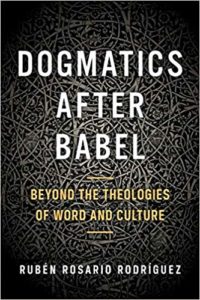Anyone surveying the contemporary theological landscape quickly concludes that there is no single approach to theology, and can legitimately wonder how to find a way through the divisions and options. Rodríguez’s book, whose intended audience includes students and practitioners of academic theology coming to the discipline from a variety of methodological and doctrinal persuasions, offers a way forward that identifies the strengths of each approach without being reduced to any one of them. Simply stated, his thesis is that the plurality of Babel is normative (xiv–xv).
The book concerns itself with the basic issues of theological methodology, and it addresses them with impressive mastery. Chapters one and two trace the history and provide an analysis of the sources of our current theological malaise. Beginning with Kierkegaard’s response to nineteenth-century liberalism, he then outlines the development of what he labels ‘theologies of word’ and ‘theologies of culture,’ the former finding mature representation in Karl Barth and the latter in Paul Tillich. Theologies of word resist capitulation to surrounding cultural norms by basing theological knowledge in its object, God, and how God has been revealed in Scripture. Theologies of culture take their cues from pressing cultural questions, claiming that answers to those questions yield genuine theological knowledge.
The end of chapter two and chapter three introduce Rodríguez’s claim that both of these methods are open to common objections. Their greatest failure is that they are restricted by Western epistemological standards, often to the exclusion of non-European marginal voices (32–33). These standards, claims Rodríguez, are still haunted by the logical positivism of the early to mid-twentieth century (cf. 113, 127). The best way for theology to find a happier epistemological home is for theologians to recognize the corrigibility and contextual nature of their claims, and it is from this point that Rodríguez begins his constructive proposal (chapters four and five).
Rodríguez’s solution, which also serves as his main argument for the book, begins with the idea that theology is always corrigible and that “multiple explanations of a complex reality…are possible, with competing explanations viewed as mutually corrective rather than mutually exclusive” (114). The most effective means of viewing them as such is to adopt a “neutral, confession-less conception of God” (139) that emphasizes the hiddenness of God in order to find the comparative commonalities in the ways that “the Abrahamic religions affirm belief in one God, and that this God has chosen to reveal God’s self in distinct and culturally particular, though not mutually exclusive, ways” (135). After presenting a common understanding of the work of the spirit in the Hebrew Bible, the Christian Bible, and the Qur’an, Rodríguez claims that this strategy will proceed by discerning the ways of the spirit in liberative movements (such as Black Lives Matter), which consequently serve as “the new loci theologici (‘places of theology’)” for dogmatics (172).
There is much to commend Rodríguez’s contribution, particularly its impressive command of sources and its ability to organize them according to where they fall on a spectrum of theological methodology. In the space of one book, Rodríguez introduces the reader to John Calvin, Thomas Aquinas, Sallie McFague, Miguel De La Torre, John Milbank, and many others. This allows for a clear orientation to the issues Rodríguez is attempting to address, and it is of immense value to have such a lucid presentation of the issues in question.
There are reasons, however, to think that this book has not ultimately resolved them. First, much of Rodríguez’s argument remains underdeveloped, which leaves it open to charges of inconsistency. The greatest challenge to comparative methods in theology comes with negotiating incommensurate or contradictory claims basic to religious traditions (such as the divinity of Jesus of Nazareth). He offers no suggestions for how to handle such situations. Second, it is not clear that his solution actually constitutes a middle way between the two approaches he lists. Theology is left with a “neutral, confession-less conception of God” and with revelation as nothing more than a “human witness to a divine act” (135), two affirmations which amount to denials of what constitutes a theology of word. By contrast, Rodriguez calls readers to affirm a Hegel-styled ‘spirit’ in liberative movements; but this is just is to prefer a theology of culture over a theology of word. Regrettably, this is not what Rodríguez set out to do; had he sought to give a defense of theologies of culture, the argument would be naturally situated within a series of predecessors like Paul Tillich. As a middle way, however, it is not satisfying.
Southern Methodist University




